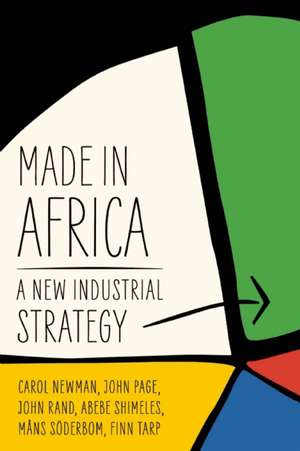Made in Africa: Learning to Compete in Industry
Autor Carol Newman, John Page, John Rand, Abebe Shimeles, Måns Söderbomen Limba Engleză Paperback – 23 feb 2016
The role of industry in low income countries is important. Industry is good for growth, job creation, and poverty reduction. All of these factors depend on the size and the rate of growth of industry. Africa doesn’t have enough industry to reach the Sustainable Development Goals for growth, job creation, and poverty reduction. Africa’s share of global manufacturing has fallen from about three percent in 1970 to less than two percent in 2010. Why is there so little industry in Africa?
Made in Africa: Learning to Compete in Industry outlines a new industrialization strategy to help Africa compete in global markets. This book draws on case study and qualitative research from Africa and emerging Asia to understand what drives firm-level productivity in low income countries. The results show that while traditional concerns such as infrastructure, skills, and the regulatory environment are important, they alone will not be sufficient for Africa to industrialize. The book also addresses how industrialization strategies will need to adapt to the region’s growing resource abundance.
Made in Africa: Learning to Compete in Industry outlines a new industrialization strategy to help Africa compete in global markets. This book draws on case study and qualitative research from Africa and emerging Asia to understand what drives firm-level productivity in low income countries. The results show that while traditional concerns such as infrastructure, skills, and the regulatory environment are important, they alone will not be sufficient for Africa to industrialize. The book also addresses how industrialization strategies will need to adapt to the region’s growing resource abundance.
Preț: 304.14 lei
Nou
Puncte Express: 456
Preț estimativ în valută:
58.21€ • 60.61$ • 49.19£
58.21€ • 60.61$ • 49.19£
Carte tipărită la comandă
Livrare economică 10-24 martie
Preluare comenzi: 021 569.72.76
Specificații
ISBN-13: 9780815728153
ISBN-10: 0815728158
Pagini: 306
Dimensiuni: 152 x 229 x 23 mm
Greutate: 0.39 kg
Editura: Brookings Institution Press
Colecția Brookings Institution Press
ISBN-10: 0815728158
Pagini: 306
Dimensiuni: 152 x 229 x 23 mm
Greutate: 0.39 kg
Editura: Brookings Institution Press
Colecția Brookings Institution Press
Notă biografică
Carol Newman is an associate professor in the Department of Economics, Trinity College Dublin. Her main research and publications are in the microeconomics of development with a focus on both household and enterprise behavior.
John Page is senior fellow in the Global Economy and Development Program of the Brookings Institution, Washington, DC and nonresident senior fellow of UNU-WIDER. He was the World Bank’s chief economist for Africa until 2008 and has published widely on industrial development and industrial policy in Africa and Asia. He is the co-author of UNIDO’s Industrial Development Report, 2009.
John Rand is a professor in development microeconomics at the University of Copenhagen. He has published extensively on the economics of the firm in developing countries, and in 2001 and 2008 he was an economic advisor to leading think tanks in Vietnam and Mozambique.
Abebe Shemeles is acting director of the Research Department of the African Development Bank. His main research interests and publications are in poverty analysis and labor economics.
Måns Söderbom is professor of economics, University of Gothenburg. His research centers on development economics and applied econometrics. He has published widely on the decisions and performance of firms.
Finn Tarp is professor of economics, University of Copenhagen, and Director, UNU-WIDER. He is a leading international expert on development strategy and foreign aid. He has held senior posts and advisory positions in government and with donor organizations and is a member of a large number of international committees and advisory bodies.
John Page is senior fellow in the Global Economy and Development Program of the Brookings Institution, Washington, DC and nonresident senior fellow of UNU-WIDER. He was the World Bank’s chief economist for Africa until 2008 and has published widely on industrial development and industrial policy in Africa and Asia. He is the co-author of UNIDO’s Industrial Development Report, 2009.
John Rand is a professor in development microeconomics at the University of Copenhagen. He has published extensively on the economics of the firm in developing countries, and in 2001 and 2008 he was an economic advisor to leading think tanks in Vietnam and Mozambique.
Abebe Shemeles is acting director of the Research Department of the African Development Bank. His main research interests and publications are in poverty analysis and labor economics.
Måns Söderbom is professor of economics, University of Gothenburg. His research centers on development economics and applied econometrics. He has published widely on the decisions and performance of firms.
Finn Tarp is professor of economics, University of Copenhagen, and Director, UNU-WIDER. He is a leading international expert on development strategy and foreign aid. He has held senior posts and advisory positions in government and with donor organizations and is a member of a large number of international committees and advisory bodies.
Textul de pe ultima copertă
Why is there so little industry in Africa?
Over the past forty years, industry has moved increasingly from the developed to the developing world, yet Africa’s share of global manufacturing has declined. Industry is critical for economic growth, job creation, and poverty reduction.
Made in Africa outlines a new strategy to help Africa get its fair share of the global market. Based on research from Africa and emerging Asia, it helps the reader understand what makes firms in low-income countries more competitive and what makes countries more attractive to competitive firms. The results: while removing such traditional constraints to industrialization as poor infrastructure, low skills, and intrusive regulations is important, this alone will not be sufficient
to help Africa thrive in the global marketplace. To compete, African governments will need to develop new policies to promote exports, build the capabilities of domestic firms, and foster industrial clusters. For African governments to succeed in implementing this new industrialization strategy, the donor community will also need a new strategy for development assistance, one focused on creating competitive economies.
Over the past forty years, industry has moved increasingly from the developed to the developing world, yet Africa’s share of global manufacturing has declined. Industry is critical for economic growth, job creation, and poverty reduction.
Made in Africa outlines a new strategy to help Africa get its fair share of the global market. Based on research from Africa and emerging Asia, it helps the reader understand what makes firms in low-income countries more competitive and what makes countries more attractive to competitive firms. The results: while removing such traditional constraints to industrialization as poor infrastructure, low skills, and intrusive regulations is important, this alone will not be sufficient
to help Africa thrive in the global marketplace. To compete, African governments will need to develop new policies to promote exports, build the capabilities of domestic firms, and foster industrial clusters. For African governments to succeed in implementing this new industrialization strategy, the donor community will also need a new strategy for development assistance, one focused on creating competitive economies.















